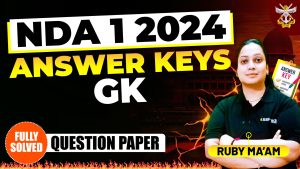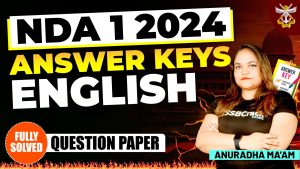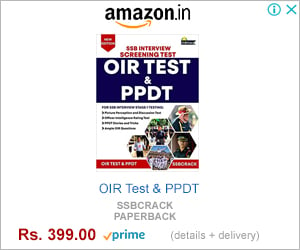The National Defence Academy (NDA) examination stands as a crucial milestone for aspiring candidates seeking a career in the defence services. Among its diverse sections, Chemistry holds significant weightage, particularly Redox Reactions, a fundamental topic. In the 2024 NDA 1 examination, the importance of Multiple Choice Questions (MCQs) in comprehending and mastering Redox Reactions cannot be overstated. This article delves into the significance of MCQs in facilitating effective learning and preparation for NDA 1 2024’s Redox Reactions Chemistry Lecture.
Understanding Redox Reactions: Redox reactions, or oxidation-reduction reactions, play a pivotal role in chemistry, involving the transfer of electrons between reactants. This concept forms the backbone of various chemical processes, from simple combustion to complex biological reactions. In the context of NDA 1 2024, a thorough understanding of redox reactions is indispensable for tackling questions effectively.
Significance of MCQs in Learning Redox Reactions:
- Conceptual Clarity: MCQs aid in solidifying conceptual understanding. By presenting diverse scenarios and options, they compel candidates to apply theoretical knowledge to practical situations. This process fosters a deeper understanding of redox reactions, enabling candidates to discern between oxidation and reduction processes accurately.
- Application-Oriented Learning: NDA 1 2024 aims to assess candidates’ ability to apply theoretical concepts to real-world scenarios. MCQs, with their varied formats and contexts, simulate such scenarios effectively. By practicing MCQs, candidates develop the skill to analyze given information critically and apply the principles of redox reactions to solve problems efficiently.
- Time Management: Time is a crucial factor in competitive examinations like NDA. MCQs, with their concise format, train candidates to analyze and respond swiftly. Through consistent practice, candidates hone their time management skills, ensuring they can complete the Chemistry section within the allocated time frame, thus maximizing their overall performance.
- Comprehensive Revision: MCQs serve as invaluable tools for comprehensive revision. They cover a wide range of topics within redox reactions, prompting candidates to revisit and reinforce their understanding of various concepts. Moreover, the immediate feedback provided by MCQs allows candidates to identify areas of weakness and focus their revision efforts accordingly.
Conclusion: In the pursuit of success in NDA 1 2024, mastering Redox Reactions holds paramount importance. MCQs emerge as indispensable allies in this endeavor, offering a structured and effective means of learning, practicing, and revising key concepts. By embracing MCQs and incorporating them into their preparation strategy, candidates can enhance their understanding, confidence, and performance in the Chemistry section, thereby inching closer to their aspirations of joining the esteemed defense services.
Redox Reactions MCQs
- In Which Compound, The Oxidation Number of Oxygen Is Positive?
A. H2O2
B. Na2O2
C. OF2
D. More than one of the above
ANSWER: C - Which Of the Following Reactions Is Not Redox?
A. 2KCIO3 → 2KCI + 3O2
B. 2KBr + CI2 → 2 KCI + Br2
C. BaCI2 + Na2SO4→ BaSO4 + 2NaCl
D. More than one of the above
ANSWER: C - Which Among the Following Happens in An Oxidation Reaction?
Electrons are gained
Electrons are lost
Protons are gained
Protons are lost
A. D
B. A
C. B
D. More than one of the above
ANSWER: C - In Acidic Medium, One Mole Of Mno4−, Accepts How Many Moles Of Electrons
In A Redox Process?
A. 1
B. 3
C. 4
D. 5
ANSWER: D - Which One of The Following Statements Is NOT Correct for The Give Reaction?
Fe(S) + CuSO4(aq) → FeSO4(aq) + Cu(s)
A. Iron is the reducing agent
B. The solution turns green in color after the reaction
C. Copper is a more reactive metal than iron
D. The reaction is an example of a redox reaction
ANSWER: C
For More MCQs On This Topic Refer To the video & Attached PDF


















